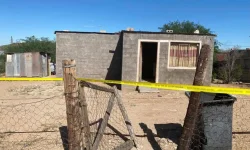An 18-year-old reportedly killed six family members at Usakos last Saturday. The attack happened between four and six thirty in the morning at the Hakhaseb settlement. Police spokesperson Ileni Shapumba said the teenager attacked relatives with weapons before setting fire to their home. The dead include 90-year-old Elisabeth, 18-year-old Fenny, six-year-olds Ibra and Raunisha, plus three-year-olds Rachel and Emi.
Anestantia Naruses remembers how her kids and their cousins made their house happy with noise and laughter before this tragedy. Everything stays quiet these days - no songs from school, no lullabies. She learned about the murders through a shocking phone call telling her she had lost her grandmother, sister, two children, and two nieces all at once. Her little ones used to rush toward her with hugs when she came home. Ibra talked a lot, but Emi chose carefully who she spoke to.
The family knows very little about what actually happened that early morning. Police and investigators hold most details, and relatives weren't allowed to share information. Geraldine Naruses, acting as family spokesperson, feels fresh pain when thinking about the young girls who should have carried on their family legacy. Fenny had big dreams of studying industrial design at the Namibian Institute of Mining and Technology. She wanted to support her grandmother, who raised her after her mother died.
Geraldine woke up that Saturday in Swakopmund, unaware of the disaster back home. Her phone remained off until she switched it on later, finding messages asking her to call. When she heard the news, she refused to believe it at first. She struggles with both anger and grief, questioning how a supposed electrical fire could cause such destruction. She asks many questions about why this happened. When she arrived at the house afterward, she found the kitchen empty instead of filled with cooking and talking relatives.
Social activist Renciah Gaes mentioned how the crime shocked everyone in the community. She pointed out problems with the local fire brigade, suggesting their lack of response might have cost lives. The town's fire truck has not worked for over five years, and no trained firefighters staff the station. Despite residents paying around N$10 monthly for fire services, these services basically do not exist. The community raised these concerns last year, but nothing changed before this terrible event occurred.
Anestantia Naruses remembers how her kids and their cousins made their house happy with noise and laughter before this tragedy. Everything stays quiet these days - no songs from school, no lullabies. She learned about the murders through a shocking phone call telling her she had lost her grandmother, sister, two children, and two nieces all at once. Her little ones used to rush toward her with hugs when she came home. Ibra talked a lot, but Emi chose carefully who she spoke to.
The family knows very little about what actually happened that early morning. Police and investigators hold most details, and relatives weren't allowed to share information. Geraldine Naruses, acting as family spokesperson, feels fresh pain when thinking about the young girls who should have carried on their family legacy. Fenny had big dreams of studying industrial design at the Namibian Institute of Mining and Technology. She wanted to support her grandmother, who raised her after her mother died.
Geraldine woke up that Saturday in Swakopmund, unaware of the disaster back home. Her phone remained off until she switched it on later, finding messages asking her to call. When she heard the news, she refused to believe it at first. She struggles with both anger and grief, questioning how a supposed electrical fire could cause such destruction. She asks many questions about why this happened. When she arrived at the house afterward, she found the kitchen empty instead of filled with cooking and talking relatives.
Social activist Renciah Gaes mentioned how the crime shocked everyone in the community. She pointed out problems with the local fire brigade, suggesting their lack of response might have cost lives. The town's fire truck has not worked for over five years, and no trained firefighters staff the station. Despite residents paying around N$10 monthly for fire services, these services basically do not exist. The community raised these concerns last year, but nothing changed before this terrible event occurred.












